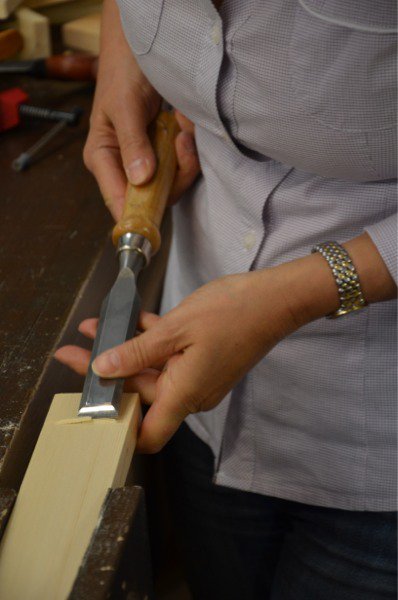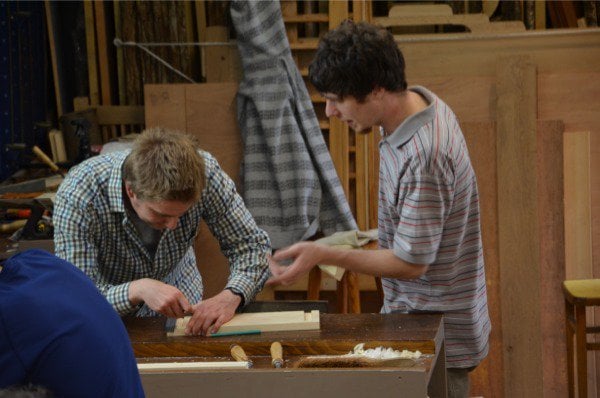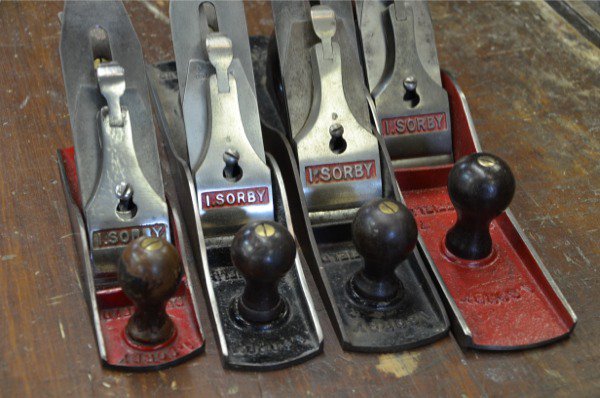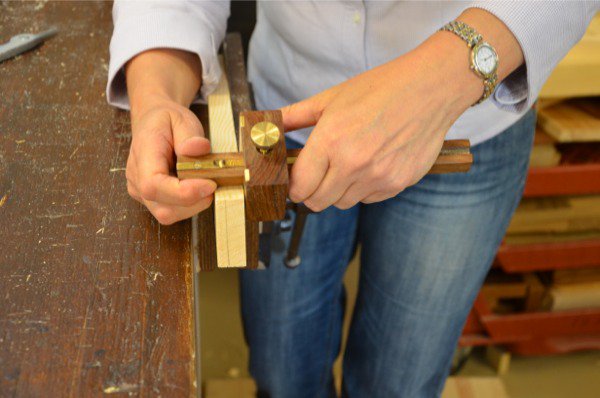Why We Woodworkers Do What We Do



Throughout the last century of course people worked more manually than people working do today. They lifted, pulled and shoved more instead of punching keys and driving machines and then exercising in gyms to create muscle that doesn’t actually do work for a reason. I hope that people can continue to pursue physical work like mine, craft work, for a worklife and don’t always pursue it as a mere hobby. Hobby seems to me to be such an empty, powerless word and I am glad there are guilds of woodworkers and that disallow words like hobby in their title as in days of old when someone described themselves as having “only a hobby’”. I don’t teach hobby woodworkers hobby woodworking but a serious alternative reality as a way of living and working with wood and tools that defy hobby. There’s much more to this thing called real woodworking than many people realise and that’s why I think that people pursue it with such a passion. Nothing and no one will stop them from working with their hands working wood every minute they get.






Mr Sellers,
Please not “dish” woodworking hobbyist, because for some this is the only way of enjoying the craft, some of us were not fortunate to work under a master or have an apprenticeship. And I think that some of all the thousands of woodworkers that follow you are just “hobbyists”; I don’t think you would have the following on your blogs if it weren’t for us “hobbyists”. It is because of you I have learnt so much more from your YouTube videos, that I have development my skills and enjoyment of woodworking, and for that I thank you. I can’t afford the odd £1000 to have someone teach me. I have made pieces of furniture for friends and family and they have paid me for it, but I wouldn’t consider it as my only means of income but it’s a start, unfortunately I live in the 21st century and have to use power tools to earn a living and to put food on the table for my family, most of us live in a city, our workshop is little more than a shed, some of us have to save to buy one tool at a time- even if it’s on eBay! Wood working is and always will be an expensive craft, both lumber and tools! These are the times we live in (some of us) so I say this with respect what you are doing is great, but sometimes I think you can be a bit “pig headed” regarding your views on what wood working is all about.
That’s not what happened here at all. Woodworkers themselves. No matter who, have redefined themselves as serious, quality woodworkers with skill and ambitions that now surpass even the professionals. They changed the stays quo of the 50s and 60s to become what they are. Amazing woodworkers! I like that.
I think you read his post too literally. I read it to say that he doesn’t like THE TERM “hobbyist” because it demeans the process of working with your hands. He is actually making a claim that what you and I do as woodworkers exceeds that because of our passion for it and for how it affects our whole life and to refer to it as simply a hobby is to diminish its contributions it makes to our lives. At least I hope I got that right.
Rich, that’s precisely how I interpreted it and how I believe Paul meant it. Well said, sir!
I don’t mean to a fend anyone least of all Paul, but what I am saying is that to be referred to as a hobbyist is what people who don’t make a living from their craft, that’s what they are called by most, and I think it is somewhat snobbery if other people don’t want to be put in that category, I call myself a wood worker, if someone says “oh you just do it for a hobby” then well… yes, I do , I’m not a fended by it because that what it is. I know quite a lot of hobbyist who paint, potter and their work is exceptional, and to them it’s only a hobby, I may have got on my soap box and “moaned” a bit I’m sorry if you think that.
Craig. I do understand what you are saying. You are right. Woodworking is a hobby if you are not doing it to earn your living. We may mistakenly feel we are looking at one issue here when we are looking at two. Thank you for bringing it up and I will be more careful not to use terms that might cause offence.
Hallo Mr. Sellers,
While I may be a “weekend warrior” when it comes to wood working, I take pride in my endeavors as a wood worker. My quality background has trained me to focus on the details and spurs me on to better myself in my so-called “hobby”. Simply because I do not make a living at it doesn’t mean that people do not appreciate what I do and the pleasure I get from the positive feedback. Labelling me a hobbyist insinuates that I am only cranking out Christmas gifts or looking for the next craft show. Let’s face it, the hobbyist from 150 years ago is now considered a craftsman because they found a style, or made a poor-man’s tool, that is now the standard that is used by the “craftsman” of today.
Craig, I think it is a question of definition.
If I got Paul right in earlier posts, what he means is, if you do your “hobby” with real passion, you are an amateur woodworker in his eyes.
On the other hand, if you just spend your leisure time on woodworking for keeping your hands busy, or, even worse, to just pose with your hobby (woodworking is more impressive (sexy) than watching TV), then your just a hobbyist.
I don’t have the means or time right now to be classified as anything more that a “hobbyist” but i’m proud of my accomplishments/gained knowledge and I don’t feel any scorn directed at me- you’re celebrating the accomplishments of your school and the opportunities available in this new information age.
I think too many people like to bitch and moan, even about great advice they’re getting for free. Noone needs to take your opinions as scripture but too many are eager to pick apart a turn of thought and make a mountain out of any little nugget they don’t agree with.
Tal cual, no entienden el espíritu de sus palabras, lo que quiere o pretende significar, lo interpretan muy literalmente. Yo que por desgracia no entiendo su idioma, entiendo bien el sentido de sus palabras Hay quienes se entretienen con la madera, como lo harian con cualquier otra cosa, como un pasatiempo cualquiera y que para esa gente, el señor Paul Seller ,no va dirigida su enseñanza. El se dirige con su enseñanza a quieres poner amor a su tarea a sus herramientas, a la madera y al logro final, por que cada trabajo cada obra es un nuevo hijo, parido desde el alma creadora, del artesano. Saludos Oscar.
I really believe that amateur is a more precise term.. It is much more than a hobby. Stamp collecting is a hobby.
All,
The way I took Paul’s post was that he was making a case for us as non-paid craftsman. I felt like he was saying that just because we may not get paid for creating objects out of wood, doesn’t make us any less artisans are Craftsman then somebody who does. I think he was saying that in his mind the word hobby or hobbyist connotes someone who undertakes inactivity casually simply to fill leisure time when they have nothing better to do. I thought he was making the case for those of us who are passionate about Woodworking regardless if we ever earned one cent from what we produce. It sounded to me as if he thought calling a lifestyle woodworker a hobbyist undercuts the seriousness of what we do and the passion we have for our undertaking. I can identify with what Paul is saying because I think he was talking about someone like me. I are in my living in a completely unrelated field, however, I yearn to spend every waking minute working wood with my hands. There are days unfortunately, when I don’t have significant amounts of time to spend in the shop. It is such an intergral part of my life that on those days I still have to walk downstairs into my shop to be among my shavings and my tools even for a few moments so that I can find peace and recenter myself. Merely smelling the scent of my shop or running my hand over a partially completed project when I don’t have time for anything more can be enough to give me my “fix”. Obviously someone not be nearly as passionate about woodworking as I am an perhaps they don’t consider themselves lifestyle workers, but I felt like Paul was trying to speak to those of us who are. Finally, I don’t think he was saying that’s calling yourself a hobbyist is bad, but for those of us or more passionate about it perhaps the word hobbyist doesn’t capture the way some of us work wood as much with our hearts and minds as we do our hands over a partially completed project when I don’t have time for anything more can be enough to give me my “fix”. Obviously some might not be nearly as passionate as I am and perhaps they don’t consider themselves lifestyle workers, but I felt like Paul was trying to speak to those of us who are. Finally, I don’t think he was saying that calling oneself a hobbyist is bad, but for those of us or more passionate about it perhaps the word hobbyist doesn’t capture the way some of us work wood as much with our hearts and minds as we do our hands.
Each of us are who we are and putting labels such as these really does not help, especially when there is such potential for miscommunication. What does help is being shown what is important for craftsmanship and mastery. Some will be satisfied just reading about it, perhaps to better appreciate what craftsman do and deepen their enjoyment of what craftsman produce, some will attempt to gain the skills with more or less success, and others will drive themselves to match their teachers’ craft. Putting labels to those outcomes is not very helpful, but respecting each other is, even if we each choose differently. I greatly appreciate Paul’s guidance in recognizing what skills are key to craft. Being free of a machine’s cutting guide so that I can shape wood to match my imagination, work in free curves rather than combinations of arc swings, or simply saw at arbitrary planes to fit a rocker to its leg all open doors for increased expression via woodworking. Our discussions in this blog have focused almost exclusively on technique (especially joinery) and lifestyle, but I think there is a missing component that is now needed if we are to advance as artisans, and that is discussion of composition. I have in mind elements of line, weight, proportion, mass, and so forth that go into making a composition which we then execute as a piece of furniture. Paul’s background includes training in design. If he were so inclined to start a chain of articles on design principles (think shape, not joinery), I think that would help us grow as artisans and help us to see spokeshaves, gouges, and other tools in new ways. I recently started to learn chip carving. The technique is simple. The mastery is largely in the design itself, understanding how the facets and chip motifs arrange to fill the carving space. Now when I see photos of woodworking and masonry in cathedrals and architecture, I see the same elements that are present in the chip carving. It has little to do with technique and everything to do with the art. I mentioned the value of blog posts on design principles, but one could also examine pieces of furniture and discuss what makes them good or, leaving ranking aside, just pointing out what is there in the ornamentation, shape, and balance that causes the piece to have one effect or another on us.
One long paragraph! Maybe it can help us to focus on being better craftsman rather than better linguists.
I am a licensed architect in California; I call myself “an architect”. I love my work. I get paid $$ for this work.
I also make things of wood, glue, … In my home shop; I call myself a woodworker at times. I build models and full size houses mostly of wood, and furniture and “arty little things of wood”, and my wife asks me to build her a desk or bookshelves, I make a lot of my own tools, ….. No $$ exchange hands, but I get paid in satisfaction, I am free from watching football or basketball on tv, I don’t spend money at IKEA for shelves or a chair I can make of recycled wood, …
One more thought:
I don’t refer to my wife as a hobbyists because she doesn’t get paid for helping raise the kids.
I’ll stop here to keep my message brief.